Whether you’re towing a sports car or a skid steer, the trailer you choose matters for safety and performance. Two of the most commonly confused options are car haulers and equipment trailers. They may look alike, but each is built for a different job.
This guide clears up the differences, helping you choose the right trailer for your needs. Car haulers are designed with lighter frames for vehicles, while equipment trailers are built to carry heavier loads like construction gear or machinery.
If you’re a contractor, landscaper, or anyone who hauls regularly, understanding car hauler vs equipment trailer can save you time, money, and damage.
Let’s break it down.
What Is a Car Hauler?
A car hauler is a type of trailer designed specifically for transporting vehicles. Whether you’re moving cars to a dealership, transporting race cars to a track, or helping someone relocate, this trailer makes loading and unloading simple and safe.
Car haulers usually come with a flat deck that is either open or enclosed. Most models include built-in ramps or tilt beds to allow low-clearance vehicles to be driven or winched up with ease. Some haulers also feature a dovetail—an angled rear portion that makes the approach angle smoother and prevents scraping.
You’ll find that car haulers are optimized for lower-weight loads, typically up to 7,000–10,000 pounds. They often use lighter axles and frames than heavy-duty trailers, which helps with fuel efficiency and towing ease.
These trailers also offer wheel-specific tie-down systems, such as E-tracks, D-rings, or wheel straps, to ensure the vehicle stays secure during transport.
What Is an Equipment Trailer?
An equipment trailer, on the other hand, is a much more heavy-duty option. These trailers are built to handle tough loads such as tractors, skid steers, forklifts, backhoes, and large landscaping gear. They often feature reinforced steel frames, multiple axles, and strong suspension systems.
Unlike a car hauler, an equipment trailer is designed to support concentrated weight in smaller areas—like under the tires or treads of a heavy machine. Most models include stake pockets, rub rails, and adjustable ramps capable of handling bulkier gear.
Many equipment trailers are deck-over designs, meaning the bed sits above the wheels. This allows for wider equipment to be hauled without being restricted by fender wells. It also improves ground clearance when loading with forklifts or cranes.
In terms of weight, equipment trailers can often handle 10,000–20,000 pounds or more, depending on the configuration. They also feature heavier axles (like 7K or 10K axles) and electric or hydraulic brakes, giving drivers more control when towing large machinery.
This is where the car hauler vs equipment trailer distinction really matters. Choosing a car hauler for a 12,000-lb skid steer could overload your trailer, break axles, or damage your truck. That’s why understanding the job is key to selecting the right trailer.
4. Key Differences Between Car Haulers and Equipment Trailers
Understanding the key differences between these two trailer types is essential for choosing the right one for your needs. While they may look similar, the details below highlight how much purpose-built design matters in the car hauler vs equipment trailer debate.
A. Trailer Bed Design
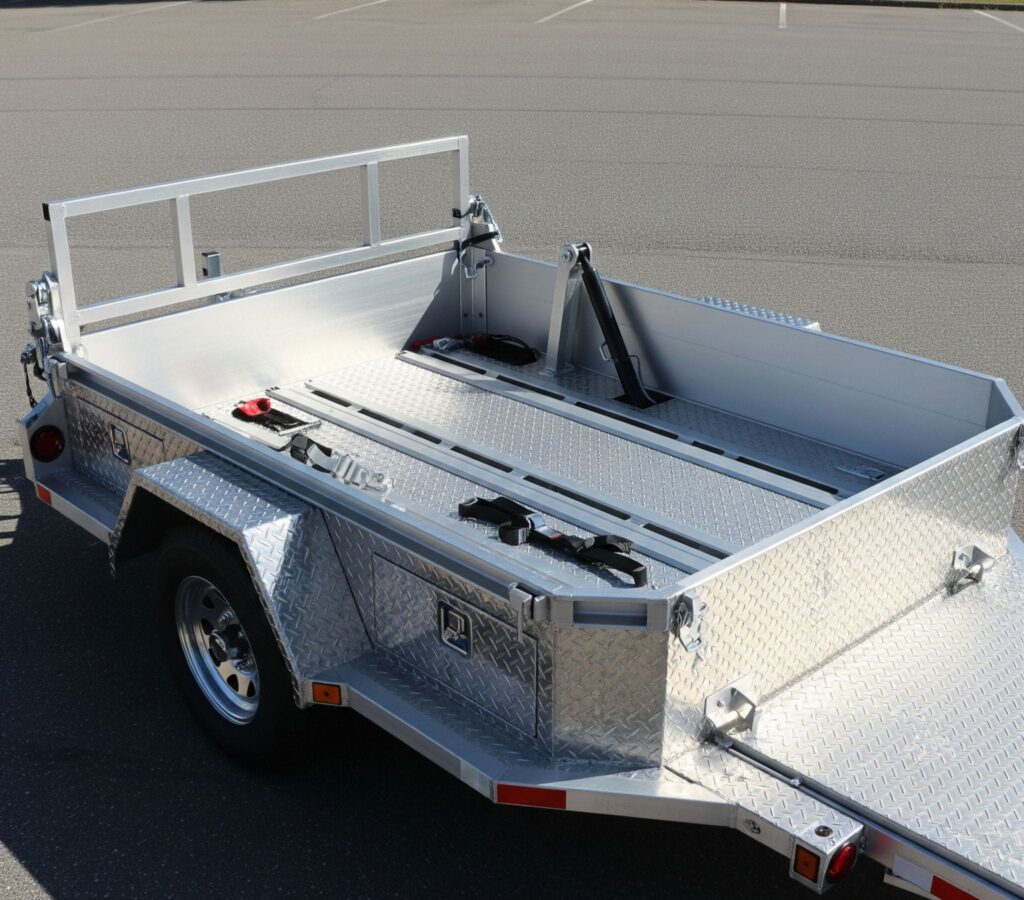
A car hauler usually has a low-profile deck that sits between the wheels (also called a “channel frame” or “drop deck”). This design makes it easier to load cars with low ground clearance without damaging the undercarriage. Some models have dovetails and tilt beds for even smoother loading angles.
In contrast, equipment trailers often use a deck-over design, where the bed sits above the wheels. This increases the overall width of the trailer and gives more loading space. It also raises the deck height, which isn’t ideal for cars but works perfectly for loading heavy machinery.
Tip: If your cargo has low ground clearance (like sedans or sports cars), a car hauler is the better fit. For taller or wider equipment, an equipment trailer is more suitable.
B. Loading Mechanism
Car haulers typically come with built-in slide-in ramps or tilt decks, ideal for rolling vehicles. Some feature dovetails for smoother angles. These are great for easy drive-on, drive-off loading.
Equipment trailers, however, need to support much heavier, often unevenly weighted machinery. They usually feature beefier stand-up ramps or fold-down ramps, sometimes with spring assists. Some models even include hydraulic lift systems for extra-heavy loads.
C. Weight Capacity
This is one of the most crucial differences. Car haulers typically handle 7,000 to 10,000 lbs. That’s enough for one or two average vehicles but not enough for heavy machinery or dense construction loads.
Equipment trailers come built for 10,000 lbs and beyond, with dual or triple axles, reinforced steel frames, and heavier-duty components throughout. This makes them ideal for tasks that involve hauling tractors, bobcats, or commercial-grade tools.
D. Axle and Suspension Setup
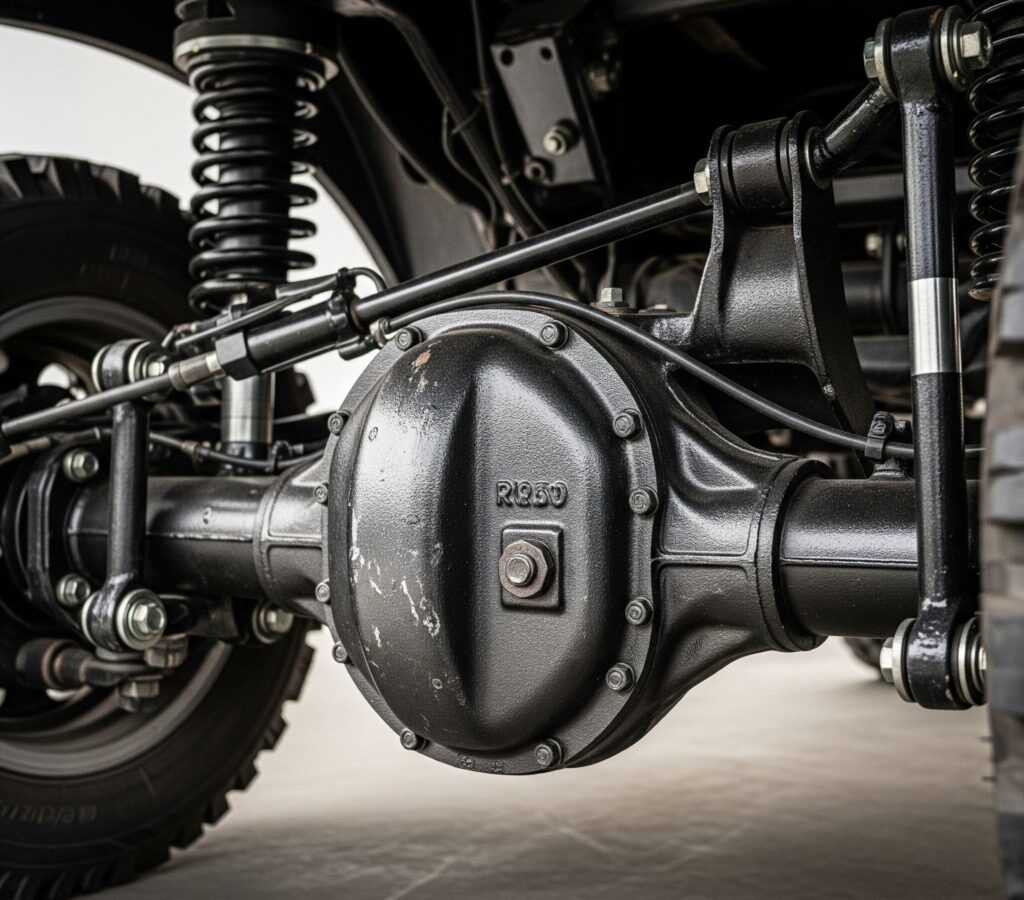
Car haulers use lighter-duty axles, such as tandem 3,500 lb or 5,200 lb axles. These offer smoother rides for vehicles and don’t require as much braking power.
Equipment trailers are outfitted with heavy-duty axles, like 7,000 lb or even 10,000 lb options, to support industrial loads. Their suspension and braking systems are also more robust, helping with stability and stopping power under heavier loads.
E. Tie-Down Options
Car haulers typically include wheel straps, D-rings, or E-track systems for securing passenger vehicles. These systems work great for 4-wheel tie-downs and are usually placed in predictable positions.
Equipment trailers, however, feature stake pockets, rub rails, and adjustable anchor points, which can accommodate odd-shaped loads and equipment with uneven centers of gravity.
Tip: This is a key factor in the car hauler vs equipment trailer decision. If you’re hauling items that don’t have wheels—or need unconventional tie-downs—you’ll want the adaptability of an equipment trailer.
When to Choose a Car Hauler?
A car hauler is your go-to trailer when the task involves transporting passenger vehicles, race cars, or anything on four wheels that fits within the trailer’s weight limit. These trailers are designed with low-profile decks, smooth ramps, and precision tie-down points, all built around one job—moving cars safely and efficiently.
You should consider a car hauler if:
- You transport vehicles often (for personal or dealership use)
- You need a lightweight trailer that’s easy to tow
- Your vehicle has low ground clearance
- You’re looking for a budget-friendly option for auto transport
- You plan to use a smaller truck or SUV for towing
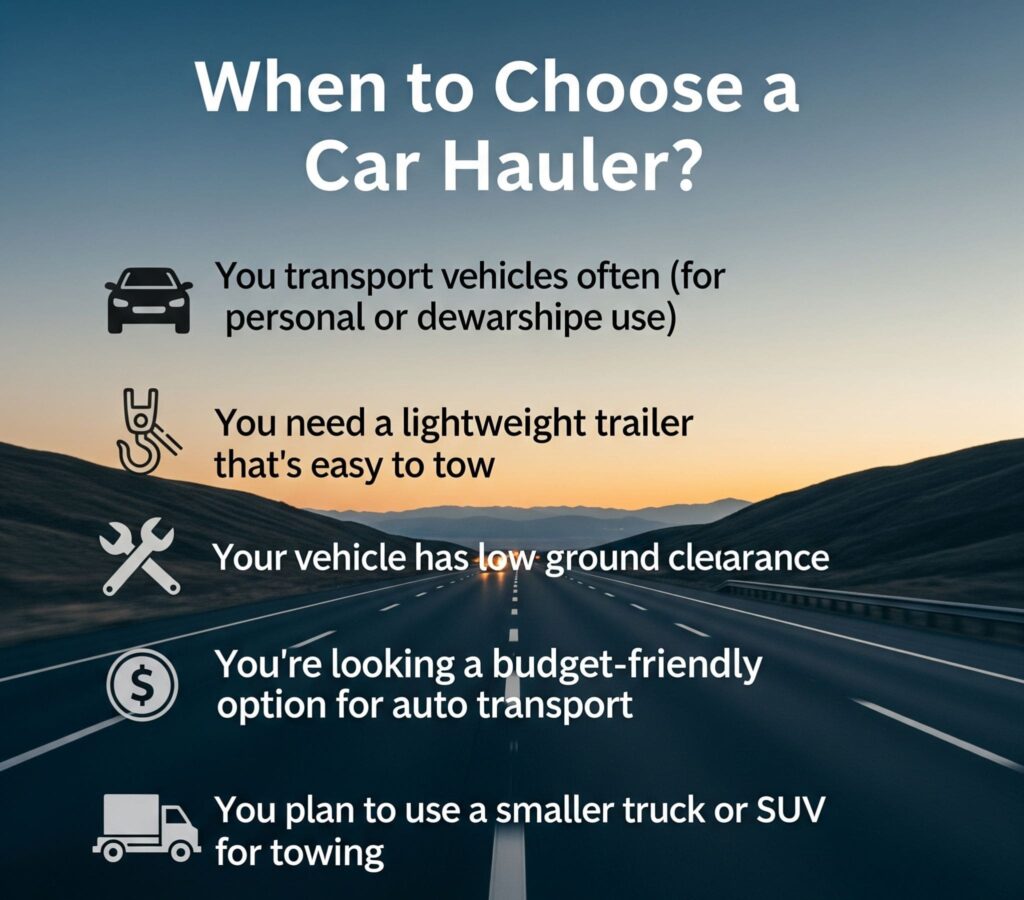
They are also great for enthusiasts and small business owners who frequently buy and sell cars or attend car shows. Car haulers provide the right balance of load capacity and maneuverability without going overboard in size or price.
Still unsure? If you’re not hauling construction tools, tractors, or heavy equipment, a car hauler likely checks all the boxes.
When to Choose an Equipment Trailer?
If your work involves heavy-duty hauling, then an equipment trailer is the smart pick. These trailers are built to carry compact loaders, mini excavators, skid steers, backhoes, and even large construction or farm gear.
You should consider an equipment trailer when:
- You’re regularly transporting heavy machinery or unevenly shaped items
- You need higher payload capacity—typically 10,000+ lbs
- Your cargo requires stronger tie-down points and load support
- You work in industries like construction, landscaping, agriculture, or equipment rental
- You need a trailer with a deck-over design for wider loads
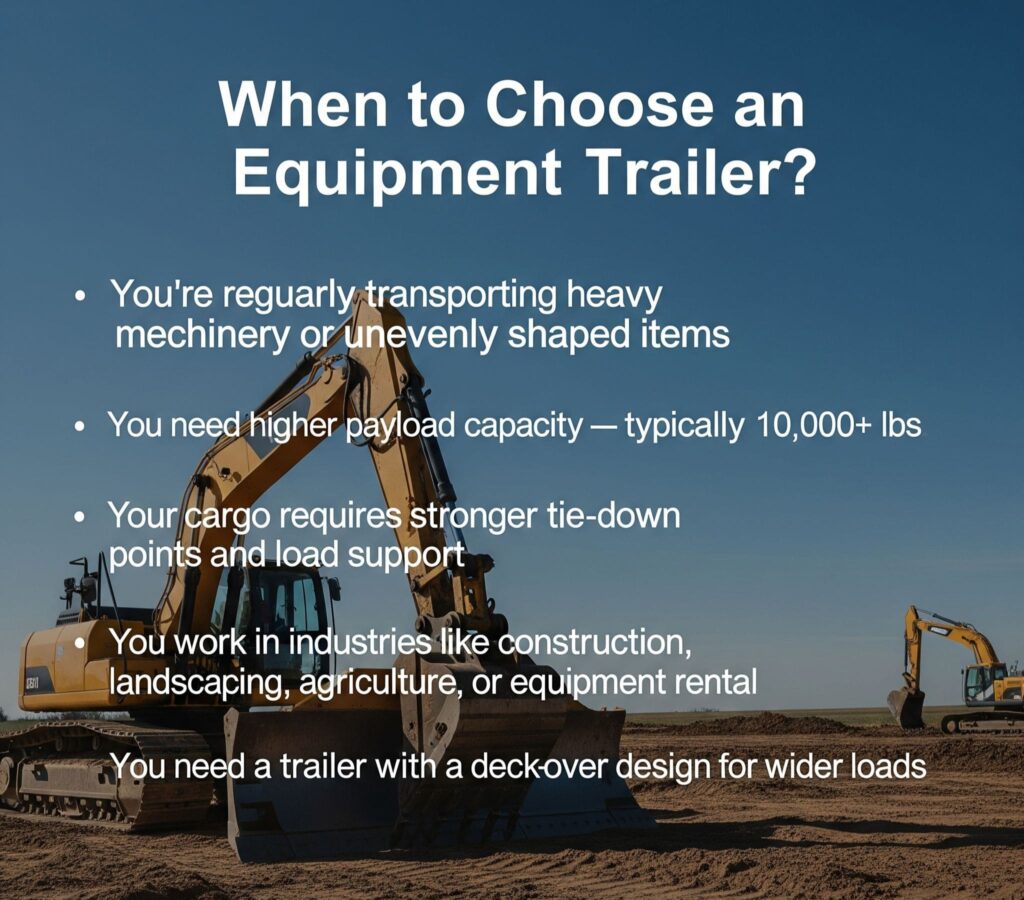
Unlike a car hauler, an equipment trailer is built for brute strength, not finesse. They come with reinforced frames, heavy-duty axles, and tougher suspension systems. This makes them essential when safety and stability under pressure matter most.
If you’re still comparing a car hauler vs equipment trailer, and your daily load involves more iron than tires, an equipment trailer is the right fit.
Which One Is Right for You?
Choosing between a car hauler vs equipment trailer comes down to one simple question: What are you hauling most often?
Here’s a quick comparison table to help:
| Feature | Car Hauler | Equipment Trailer |
|---|---|---|
| Best For | Cars, trucks, SUVs | Machinery, tractors, skid steers |
| Deck Height | Lower (between wheels) | Higher (deck-over) |
| Weight Capacity | 7,000–10,000 lbs | 10,000–20,000+ lbs |
| Tie-Down System | Wheel straps, D-rings | Stake pockets, rub rails, chain hooks |
| Ramp System | Slide-in or tilt ramps | Heavy-duty fold-down or stand-up ramps |
| Ideal Use Case | Auto transport | Construction, landscaping, agriculture |
Still unsure? Ask yourself:
- Do I need to haul cars or light vehicles only? → Go with a car hauler.
- Do I haul heavier or more irregular equipment? → You’ll want an equipment trailer.
Remember, choosing the right trailer saves you money in maintenance, improves safety, and protects your cargo from damage. The car hauler vs equipment trailer comparison isn’t just about price—it’s about using the right tool for the job.
Conclusion
The difference between a car hauler and an equipment trailer might seem small at first glance—but in the real world, it matters a lot. Whether you’re towing a family car or a multi-ton excavator, choosing the right trailer makes your work smoother, safer, and more cost-effective.
Both trailer types have their place. Car haulers are ideal for transporting vehicles with low ground clearance, while equipment trailers are built to tackle rugged loads and tougher conditions. Understanding these differences helps you make a smart, informed decision—and keeps you ready for whatever the road throws your way.
At Phoenix Trailers, we are always ready to assist you. Whether you need a car hauler or and equipment trailer, we have all the options ready for you and there a variety of designs and models that you can choose from. All you need to do is just visit us at our office, sip a nice coffee and make your decision!
FAQs (Frequently Asked Questions)
1. Can I use a car hauler to transport small equipment like mowers or ATVs?
Yes, but with caution. Light equipment like lawnmowers or ATVs can be carried on a car hauler—as long as the weight doesn’t exceed the trailer’s limit and the cargo is safely strapped down. Still, an equipment trailer will offer more flexibility and security.
2. What is the average cost difference between the two?
Car haulers typically cost $2,500 to $6,000, while equipment trailers range from $4,000 to $10,000+, depending on size, axle setup, and features.
3. Can I tow either trailer with an SUV or half-ton pickup?
Most car haulers are fine for light-duty pickups or full-size SUVs. Equipment trailers, especially those with higher weight ratings, usually require a ¾-ton or 1-ton truck for safe towing.
4. Are equipment trailers more difficult to maneuver?
They can be, especially with deck-over designs that sit higher and have a wider turning radius. Car haulers tend to be easier to navigate, especially in tight spaces.

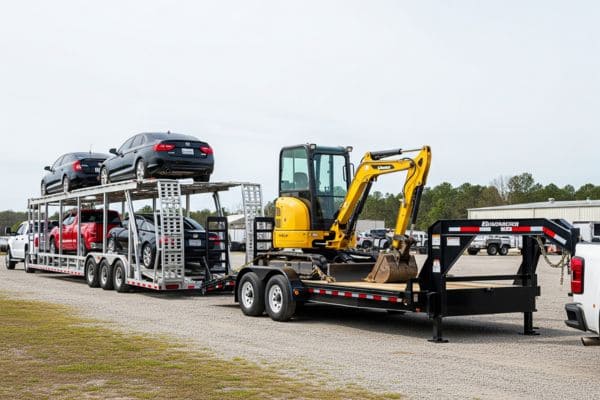
Leave a Reply